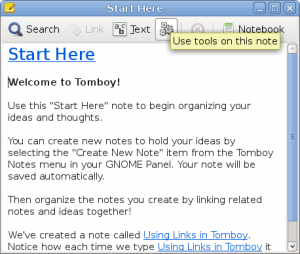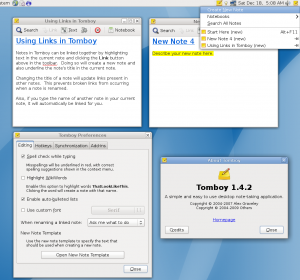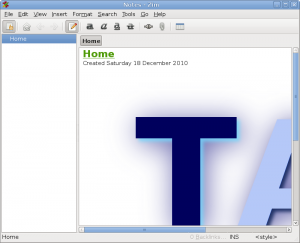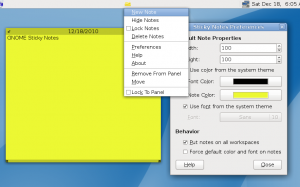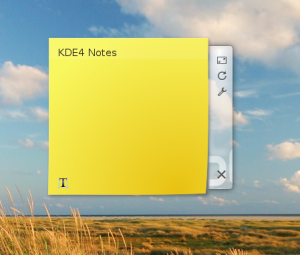Update: Read an updated reference of 12 notes applications here.
Tomboy
Tomboy is a feature-rich notes application for GNOME with support for spell-checking, links, font style and size, bullet lists, global shortcuts, and plugins. Tomboy will also let you search notes and export them to HTML. The plugins (called add-ins in Tomboy) include exporting to HTML, backlinks to see what other notes link to the current note, Evolution Mail integration, printing support, local directory synchronization.
BasKet
This is one of my favorite KDE applications. BasKet is called by some a killer application for Linux, due to its completeness regarding features and a different approach compared to other notes applications. BasKet organizes your notes in one or two columns, but it also allows to make them float around in the workspace. It supports inserting images, links, URIs to local files, tag notes, use priority colors, import/export, backup and restore notes, and much, much more.
Zim
According to the homepage, Zim brings the concept of a Wiki to your desktop. Written in Python with GTK bindings, Zim saves the notes as Wiki text and besides font styling and coloring features it also offers an autosave feature which allow to edit several notes at once without the need to worry about saving them. Zim allows you to insert images and symbols in the notes and comes bundled with several plugins (for most of them you will need additional dependencies). Among plugins there is GNU Plot integration, equations, diagramas, spell-checker, tray icon integration.
GNOME Sticky Notes
GNOME Sticky Notes is a simplistic application which can be added to the panel as a widget, and allows you to “stick” notes on your desktop. Among the basic features it offers are notes colors and background color, change the font size or sticking notes to all available workspaces.
KDE Notes Widget
This is just GNOME Sticky Notes, only for KDE. It allows configurable font sizes and colors, global keyboard shortcut and spellchecking.
I could also mention here NoteCase Pro, a commercial application with lots of features. The open-source version, although discontinued in 2008, is still available to download here. In Debian/Ubuntu, you can download the i386 DEB and install it by typing dpkg -i notecase_1.9.8_i386.deb as root in a terminal.
Yup Basket is awesome. By far the best note taking app I’ve managed to find for Linux also vry useful for mind-mapping and other organization of your thoughts.
Oh I forgot to mention that you missed another very nice note-taking app – KJots – http://userbase.kde.org/KJots
Probably the second best after Basket
It’s worth mentioning tomboy uses momo thus it’s bloated and memory hungry, Mono is MS c# implementation btw.
Yeah, I was pretty disappointed in the tomboy inclusion. Zim isn’t too bad. If you want tomboy, just use gnote. Faster and minus the mono crap.
But there are at least two alternatives to Tomboy that are not Mono based (Gnotes which I use on the desktop and Conboy which is on my N900).
I find it really neat. Now if I could just finish my web based version or find an existing one it would be the perfect tool of my use.
I’m using KeepNote – the screen shot/clipping ability comes in handy too.
I used GJots for some time – that was useful. But I will look into Zim – it looks much more polished than the last time I used it.
take a look at Silence
http://silence.sekalura.net
VIm plus Vimoutliner (https://github.com/vimoutliner/vimoutliner) — you can’t possibly work any faster.
wow, Zim is awesome!! this is a real hidden gem. this app should be much more well known. thy.
I use CherryTree (similar to Notecase). It comes with syntax highlighting, excellent for code snippets.
Zim used to be my favorite but I had some issues with tabs and spaces when I was saving some code snippets.




